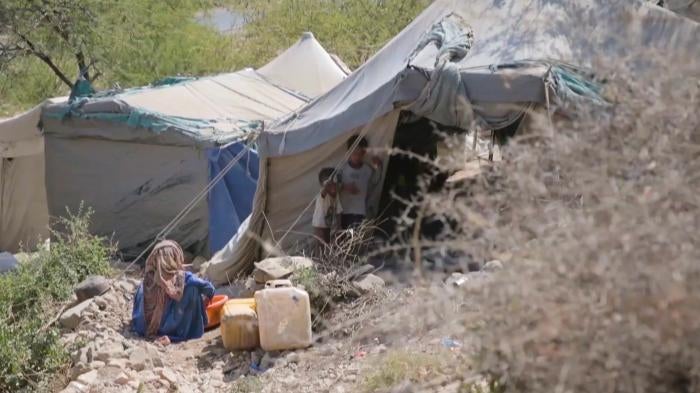Aid Restriction in Yemen Puts Millions at Risk
Read a text description of this video
Gerry Simspon, Human Rights Watch
Warring parties in Yemen have ravaged the country since March 2015, and contributed to what the UN calls “the world’s worst humanitarian crisis.
Almost 25 million people need some form of aid, including millions of malnourished children. The country’s healthcare system has almost collapsed and has struggled to cope with cholera and other disease outbreaks.
Covid-19 has spread unchecked due to the stigma of being infected with the virus and a shortage of medical supplies, healthcare centers and health workers. This has made an already dire situation even worse.
Nathan Al-Hussami, Hospital Director
The pandemic has devastated powerful nations, let alone a country like Yemen, whose hospitals are decimated.
Gerry Simspon, Human Rights Watch
Since the Houthis took control of northern and central Yemen in late 2014, humanitarian agencies have worked hard to get aid to millions of Yemenis, but the armed group has severely restricted their work.
They have delayed or blocked aid projects, heavily interfered with projects they do approve, diverted aid, and attacked aid staff and their property. Yemeni government authorities who control the south are also increasingly interfering with aid agencies’ work.
Aid obstruction has denied millions of Yemenis access to food, water, healthcare, sanitation, and other life-saving services.
The obstruction has also affected aid agencies’ ability to do everything they can to prevent the spread of Covid-19, such as by blocking primary healthcare projects and access to the country’s under-serviced hospitals and clinics.
Khadija Ali, hospital worker
We struggled a lot due to a lack of medicine and medical supplies such as equipment and comprehensive health facilities.
Feryan Ahmed, Technical Director
We suffer from a lack of Personal Protective Equipment for all the medical staff in the isolation center, and for patients.
Gerry Simspon, Human Rights Watch
In June 2020, international donors slashed their funding for aid agencies in Yemen, in part because of the Houthis’ long-standing and increasing aid obstruction.
The lack of money has forced aid agencies to cut many of their life-saving services.
The Saudi-led coalition fighting the Houthis has also attacked medical facilities and imposed measures blocking and then restricting the country’s access to essential goods. However to end the current aid crisis, the Houthis and the Yemeni government should immediately end their aid obstruction and allow aid agencies to work without interference to help millions of people in need.
The Houthi armed group and other authorities are severely restricting the delivery of desperately needed aid in Yemen. The situation is exacerbating the country’s dire humanitarian situation and weakening its response to the Covid-19 pandemic.

